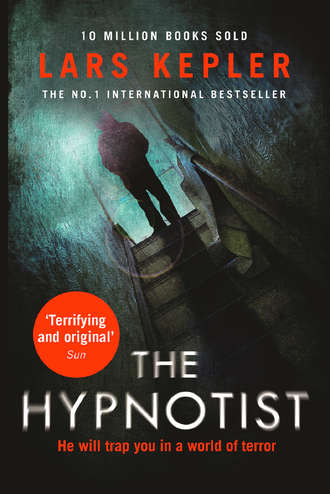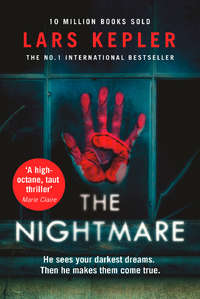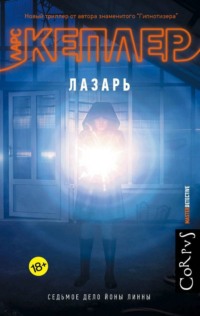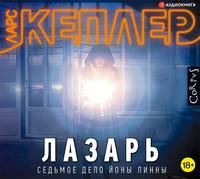
Полная версия
The Hypnotist

THE
HYPNOTIST
LARS KEPLER
Translated from the Swedish by Ann Long

Copyright
Published by Blue Door an imprint of
HarperCollinsPublishers Ltd.
1 London Bridge Street
London, SE1 9GF
www.harpercollins.co.uk
First published in Great Britain by Blue Door 2011
Copyright © Lars Kepler 2009
English translation © Ann Long 2010
Originally published in 2009 by Albert Bonniers Förlag, Sweden, as Hypnotisören
Cover layout design © HarperCollinsPublishers Ltd 2012
Lars Kepler asserts the moral right to be identified as the author of this work.
A catalogue copy of this book is available from the British Library.
This novel is entirely a work of fiction. The names, characters and incidents portrayed in it are the work of the author’s imagination. Any resemblance to actual persons, living or dead, events or localities is entirely coincidental.
All rights reserved under International and Pan-American Copyright Conventions. By payment of the required fees, you have been granted the non-exclusive, non-transferable right to access and read the text of this e-book on screen. No part of this text may be reproduced, transmitted, down-loaded, decompiled, reverse engineered, or stored in or introduced into any information storage and retrieval system, in any form or by any means, whether electronic or mechanical, now known or hereinafter invented, without the express written permission of HarperCollins.
HarperCollinsPublishers has made every reasonable effort to ensure that any picture content and written content in this ebook has been included or removed in accordance with the contractual and technological constraints in operation at the time of publication
Source ISBN: 9780007359127
Ebook Edition © August 2013 ISBN: 9780007412457
Version: 2018-06-14
International praise for The Hypnotist:
‘Ferocious, visceral storytelling that wraps you in a cloak of darkness. It’s stunning’
Daily Mail
‘One of the best – if not the best – Scandinavian crime thrillers I’ve read’
Sam Baker, Red
‘A creepy and compulsive crime thriller’
Mo Hayder
‘Intelligent, original and chilling’
Simon Beckett
‘Mesmerizing … a bad dream that takes hold and won't let go’
Wall Street Journal
‘Crammed with memorable characters and well-crafted subplots’
The Sunday Times
‘Grips you round the throat until the final twist’
Woman & Home
‘A serious, disturbing, highly readable novel that is finally a meditation on evil’
Washington Post
‘A rollercoaster ride of a thriller full of striking twists’
Mail on Sunday
‘Riddled with irresistible, nail-biting suspense, this first-class Scandinavian thriller is one of the best I’ve ever read’
Australian Women’s Weekly
‘Lars Kepler enthralls readers with The Hypnotist, just like Stieg Larsson did with the Millennium series’
Norrköpings Tidningar, Sweden
‘A breathtaking thriller, which uncovers the many unpleasant sides of the human psyche. He opens the door to a human abyss’
Borås Tidning, Sweden
‘The cracking pace and absorbing story mean it cannot be missed’
Courier Mail, Australia
‘As Nordic thrillers go, it doesn’t get more delightfully dark and existentially, satisfyingly murky than The Hypnotist’
Boston Globe
‘Far more energetic than Henning Mankell, as socially involved as Larsson but a better writer, Kepler matches the great Jo Nesbo for gothic excitement’
Weekend Australian
‘An horrific and original read’
Sun
‘Creepy and addictive’
She
‘Brilliant, well written and very satisfying. A superb thriller’
De Telegraaf, Netherlands
‘[An] outstanding thriller debut’
Publishers Weekly
‘Utterly outstanding’
Morgenavisen Jyllands-Posten, Denmark
‘Disturbing, dark and twisted’
Easy Living
‘An international book written for an international audience’
Huffington Post
‘Makes Derren Brown look tame … So gripping you won’t be able to put it down’
Essentials
‘A new star enters the firmament of Scandinavian thrillerdom’
Kirkus Reviews
‘Engaging characters and a truly gripping opening … This is definitely a series to watch’
Globe and Mail, Canada
‘Simply mesmerizing’
Edmonton Journal
Also by Lars Kepler
The Nightmare
The Fire Witness
The Sandman
Table of Contents
Title Page
Copyright
International praise for The Hypnotist
Also by Lars Kepler
Chapter 1
Chapter 2
Chapter 3
Chapter 4
Chapter 5
Chapter 6
Chapter 7
Chapter 8
Chapter 9
Chapter 10
Chapter 11
Chapter 12
Chapter 13
Chapter 14
Chapter 15
Chapter 16
Chapter 17
Chapter 18
Chapter 19
Chapter 20
Chapter 21
Chapter 22
Chapter 23
Chapter 24
Chapter 25
Chapter 26
Chapter 27
Chapter 28
Chapter 29
Chapter 30
Chapter 31
Chapter 32
Chapter 33
Chapter 34
Chapter 35
Chapter 36
Chapter 37
Chapter 38
Chapter 39
Chapter 40
Chapter 41
Chapter 42
Chapter 43
Chapter 44
Chapter 45
Chapter 46
Chapter 47
Chapter 48
Chapter 49
Chapter 50
Chapter 51
Chapter 52
Chapter 53
Chapter 54
Chapter 55
Chapter 56
Chapter 57
Chapter 58
Chapter 59
Chapter 60
Chapter 61
Chapter 62
Chapter 63
Chapter 64
Chapter 65
Chapter 66
Chapter 67
Chapter 68
Chapter 69
Chapter 70
Chapter 71
Chapter 72
Chapter 73
Chapter 74
ten years ago
Chapter 75
Chapter 76
Chapter 77
Chapter 78
Chapter 79
Chapter 80
Chapter 81
Chapter 82
Chapter 83
Chapter 84
Chapter 85
Chapter 86
Chapter 87
Chapter 88
Chapter 89
Chapter 90
Chapter 91
Chapter 92
Chapter 93
Chapter 94
Chapter 95
Chapter 96
Chapter 97
Chapter 98
Chapter 99
Chapter 100
Chapter 101
Chapter 102
Chapter 103
Chapter 104
Chapter 105
Chapter 106
Chapter 107
Chapter 108
Chapter 109
Chapter 110
About the Author
About the Publisher
In Greek mythology, the god Hypnos is a winged boy with poppy seeds in his hand. His name means sleep. He is the twin brother of Thanatos, death, and the son of night and darkness.
The term hypnosis was first used in its modern sense in 1843 by the Scottish surgeon James Braid. He used this term to describe a sleeplike state of both acute awareness and great receptiveness.
Even today, opinions vary with regard to the usefulness, reliability, and dangers of hypnosis. This lingering ambivalence is presumably owing to the fact that the techniques of hypnosis have been exploited by con men, stage performers, and secret services all over the world.
From a purely technical point of view, it is easy to place a person in a hypnotic state. The difficulty lies in controlling the course of events, guiding the patient, and interpreting and making use of the results. Only through considerable experience and skill is it possible to master deep hypnosis fully. There are only a handful of recognised doctors in the world who have mastered hypnosis.
Like fire, just like fire. Those were the first words the boy uttered under hypnosis. Despite life-threatening injuries—innumerable knife wounds to his face, legs, torso, back, the soles of his feet, the back of his neck, and his head—the boy had been put into a state of deep hypnosis in an attempt to see what had happened with his own eyes.
“I’m trying to blink,” he mumbled. “I go into the kitchen, but it isn’t right; there’s a crackling noise between the chairs and a bright red fire is spreading across the floor.”
They’d thought he was dead when they found him among the other bodies in the terraced house. He’d lost a great deal of blood, gone into a state of shock, and hadn’t regained consciousness until seven hours later. He was the only surviving witness.
Detective Joona Linna was certain that the boy would be able to provide valuable information, possibly even identify the killer.
But if the other circumstances had not been so exceptional, it would never even have occurred to anyone to turn to a hypnotist.
1
tuesday, december 8: early morning
Erik Maria Bark is yanked reluctantly from his dream when the telephone rings. Before he is fully awake, he hears himself say with a smile, “Balloons and streamers.”
His heart is pounding from the sudden awakening. Erik has no idea what he meant by these words. The dream is completely gone, as if he had never had it.
He fumbles to find the ringing phone, creeping out of the bedroom with it and closing the door behind him to avoid waking Simone. A detective named Joona Linna asks if he is sufficiently awake to absorb important information. His thoughts are still tumbling down into the dark empty space after his dream as he listens.
“I’ve heard you’re very skilled in the treatment of acute trauma,” says Linna.
“Yes,” says Erik.
He swallows a painkiller as he listens. The detective explains that he needs to question a fifteen-year-old boy who has witnessed a double murder and been seriously injured himself. During the night he was moved from the neurological unit in Huddinge to the neurosurgical unit at Karolinska University Hospital in Solna.
“What’s his condition?” Erik asks.
The detective rapidly summarises the patient’s status, concluding, “He hasn’t been stabilised. He’s in circulatory shock and unconscious.”
“Who’s the doctor in charge?” asks Erik.
“Daniella Richards.”
“She’s extremely capable. I’m sure she can—”
“She was the one who asked me to call you. She needs your help. It’s urgent.”
When Erik returns to the bedroom to get his clothes, Simone is lying on her back, looking at him with a strange, empty expression. A strip of light from the streetlamp is shining in between the blinds.
“I didn’t mean to wake you,” he says softly.
“Who was that?” she asks.
“Police … a detective … I didn’t catch his name.”
“What’s it about?”
“I have to go to the hospital,” he replies. “They need some help with a boy.”
“What time is it, anyway?” She looks at the alarm clock and closes her eyes. He notices the stripes on her freckled shoulders from the creased sheets.
“Sleep now, Sixan,” he whispers, calling her by her nickname.
Carrying his clothes from the room, Erik dresses quickly in the hall. He catches the flash of a shining blade of steel behind him and turns to see that his son has hung his ice skates on the handle of the front door so he won’t forget them. Despite his hurry, Erik finds the protectors in the closet and slides them over the sharp blades.
It’s three o’clock in the morning when Erik gets into his car. Snow falls slowly from the black sky. There is not a breath of wind, and the heavy flakes settle sleepily on the empty street. He turns the key in the ignition, and the music pours in like a soft wave: Miles Davis, ‘Kind of Blue.’
He drives the short distance through the sleeping city, out of Luntmakargatan, along Sveavägen to Norrtull. He catches a glimpse of the waters of Brunnsviken, a large, dark opening behind the snowfall. He slows as he enters the enormous medical complex, manoeuvring between Astrid Lindgren’s understaffed hospital and maternity unit, past the radiology and psychiatry departments, to park in his usual place outside the neurosurgical unit. There are only a few cars in the visitors’ car park. The glow of the streetlamps is reflected in the windows of the tall buildings, and blackbirds rustle through the branches of the trees in the darkness. Usually you hear the roar of the motorway from here, Erik thinks, but not at this time of night.
He inserts his pass card, keys in the six-digit code, enters the lobby, takes the lift to the fifth floor, and walks down the hall. The blue vinyl floors shine like ice, and the corridor smells of antiseptic. Only now does he become aware of his fatigue, following the sudden surge of adrenaline brought on by the call. It had been such a good sleep, he still felt a pleasant aftertaste.
He thinks over what the detective told him on the telephone: a boy is admitted to the hospital, bleeding from cuts all over his body, sweating; he doesn’t want to lie down, is restless and extremely thirsty. An attempt is made to question him, but his condition rapidly deteriorates. His level of consciousness declines while at the same time his heart begins to race, and Daniella Richards, the doctor in charge, makes the correct decision not to let the police speak to the patient.
Two uniformed policemen are standing outside the door of ward N18; Erik senses a certain unease flit across their faces as he approaches. Maybe they’re just tired, he thinks, as he stops in front of them and identifies himself. They glance at his ID, press a button, and the door swings open with a hum.
Daniella Richards is making notes on a chart when Erik walks in. As he greets her, he notices the tense lines around her mouth, the muted stress in her movements.
“Have some coffee,” she says.
“Do we have time?” asks Erik.
“I’ve got the bleed in the liver under control,” she replies.
A man of about forty-five, dressed in jeans and a black jacket, is thumping the coffee machine. He has tousled blond hair, and his lips are serious, clamped firmly together. Erik thinks maybe this is Daniella’s husband, Magnus. He has never met him; he has only seen a photograph in her office.
“Is that your husband?” he asks, waving his hand in the direction of the man.
“What?” She looks both amused and surprised.
“I thought maybe Magnus had come with you.”
“No,” she says, with a laugh.
“I don’t believe you,” teases Erik, starting to walk toward the man. “I’m going to ask him.”
Daniella’s mobile phone rings and, still laughing, she flips it open, saying, “Stop it, Erik,” before answering, “Daniella Richards.” She listens but hears nothing. “Hello?” She waits a few seconds, then shrugs. “Aloha!” she says ironically and flips the phone shut.
Erik has walked over to the blond man. The coffee machine is whirring and hissing. “Have some coffee,” says the man, trying to hand Erik a mug.
“No, thanks.”
The man smiles, revealing small dimples in his cheeks, and takes a sip himself. “Delicious,” he says, trying once again to force a mug on Erik.
“I don’t want any.”
The man takes another sip, studying Erik. “Could I borrow your phone?” he asks suddenly. “If that’s okay. I left mine in the car.”
“And now you want to borrow mine?” Erik asks stiffly.
The blond man nods and looks at him with pale eyes as grey as polished granite.
“You can borrow mine again,” says Daniella, who has come up behind Erik.
He takes the phone, looks at it, then glances up at her. “I promise you’ll get it back,” he says.
“You’re the only one who’s using it anyway,” she jokes.
He laughs and moves away.
“He must be your husband,” says Erik.
“Well, a girl can dream,” she says with a smile, glancing back at the lanky fellow.
Suddenly she looks very tired. She’s been rubbing her eyes; a smudge of silver-grey eyeliner smears her cheek.
“Shall I have a look at the patient?” asks Erik.
“Please.” She nods.
“As I’m here anyway,” he hastens to add.
“Erik, I really do want your opinion, I’m not at all sure about this one.”
2
tuesday, december 8: early morning
Daniella Richards opens the heavy door and he follows her into a warm recovery room leading off the operating theatre. A slender boy is lying on the bed. Despite his injuries, he has an attractive face. Two nurses work to dress his wounds: there are hundreds of them, cuts and stab wounds all over his body, on the soles of his feet, on his chest and stomach, on the back of his neck, on the top of his scalp, on his face.
His pulse is weak but very rapid, his lips are as grey as aluminium, he is sweating, and his eyes are tightly closed. His nose looks as if it is broken. Beneath the skin, a bleed is spreading like a dark cloud from his throat and down over his chest.
Daniella begins to run through the different stages in the boy’s treatment so far but is silenced by a sudden knock at the door. It’s the blond man again; he waves to them through the glass pane.
“Fine,” says Erik. “If he isn’t Magnus, who the hell is that guy?”
Daniella takes his arm and guides him from the recovery room. The blond man has returned to his post by the hissing coffee machine.
“A large cappuccino,” he says to Erik. “You might need one before you meet the officer who was first on the scene.”
Only now does Erik realise that the blond man is the detective who woke him up less than an hour ago. His drawl was not as noticeable on the telephone, or maybe Erik was just too sleepy to register it.
“Why would I want to meet him?”
“So you’ll understand why I need to question—”
Joona Linna falls silent as Daniella’s mobile starts to ring. He takes it out of his pocket and glances at the display, ignoring her outstretched hand.
“It’s probably for him anyway,” mutters Daniella.
“Yes,” Joona is saying. “No, I want him here … OK, but I don’t give a damn about that.” The detective is smiling as he listens to his colleague’s objections. “Although I have noticed something,” he chips in.
The person on the other end is yelling.
“I’m doing this my way,” Joona says calmly, and ends the conversation. He hands the phone back to Daniella with a silent nod of thanks. “I have to question this patient,” he explains, in a serious tone.
“I’m sorry,” says Erik. “My assessment is the same as Dr Richards’.”
“When will he be able to talk to me?” asks Joona.
“Not while he’s in shock.”
“I knew you’d say that,” says Joona quietly.
“The situation is still extremely critical,” explains Daniella. “His pleural sack is damaged, the small intestine, the liver, and—”
A policeman wearing a dirty uniform comes in, his expression uneasy. Joona waves, walks over, and shakes his hand. He says something in a low voice, and the police officer wipes his mouth and glances apprehensively at the doctors.
“I know you probably don’t want to talk about this right now,” says Joona. “But it could be very useful for the doctors to know the circumstances.”
“Well,” says the police officer, clearing his throat feebly, “we hear on the radio that a caretaker’s found a dead man in the toilet at the playing field in Tumba. Our patrol car’s already on Huddingevägen, so all we need to do is turn and head up towards the lake. We reckoned it was an overdose, you know? Jan, my partner, he goes inside while I talk to the caretaker. Turns out to be something else altogether. Jan comes out of the locker room; his face is completely white. He doesn’t even want me to go in there. So much blood, he says three times, and then he just sits down on the steps …”
The police officer falls silent, sits in a chair, and stares straight ahead.
“Can you go on?” asks Joona.
“Yes … The ambulance shows up, the dead man is identified, and it’s my responsibility to inform the next of kin. We’re a bit short-staffed, so I have to go alone. My boss says she doesn’t want to let Jan go out in this state; you can understand why.”
Erik glances at the clock.
“You have time to listen to this,” says Joona.
The police officer goes on, his eyes lowered. “The deceased is a teacher at the high school in Tumba, and he lives in that development up by the ridge. I rang the bell three or four times, but nobody answered. I don’t know what made me do it, but I went round the whole block and shone my torch through a window at the back of the house.” The police officer stops, his mouth trembling, and begins to scrape at the arm of the chair with his fingernail.
“Please go on,” says Joona.
“Do I have to? I mean, I … I …”
“You found the boy, the mother, and a little girl aged five. The boy, Josef, was the only one who was still alive.”
“Although I didn’t think …” He falls silent, his face ashen.
Joona relents. “Thank you for coming, Erland.”
The police officer nods quickly and gets up, runs his hand over his dirty jacket in confusion, and hurries out of the room.
“They had all been attacked with a knife,” Joona Linna says. “It must have been sheer chaos in there. The bodies were … they were in a terrible state. They’d been kicked and beaten. They’d been stabbed, of course, multiple times, and the little girl … she had been cut in half. The lower part of her body from the waist down was in the armchair in front of the TV.”









